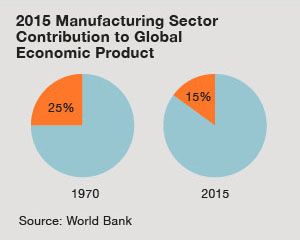Source: Advanced Economies Must Still Make Things – IEEE Spectrum
Take away manufacturing and you’re left with…selfies
At the end of 2015, Facebook, that purveyor of updated selfies, had a market capitalization of nearly $300 billion, about 50 percent more than Toyota, the world’s premier maker of passenger cars. … manufacturing is still important for the health of a country’s economy, because no other sector can generate nearly as many well-paying jobs. Take Facebook, which at the end of last year had 12,691 employees, versus the 344,109 that Toyota had at the end of its fiscal year, in March 2015. Making things still matters.
The top four economies remain the top four manufacturing powers, accounting for about 55 percent of the world’s manufacturing output in 2015.
If you rank countries by per capita manufacturing value, then Germany, with more than $9,500 in 2014, came out on top among the big four, followed by Japan with nearly $7,000, the United States with about $6,500, and China with only $2,100. But the global leader here was Switzerland, with more than $15,000 per capita.
…
The net balance of international trade in manufactured items is also revealing because it indicates two things: the extent to which a nation can satisfy its need for products and the demand for its products abroad. Switzerland again came out on top, with a 2014 per capita surplus of about $5,200, followed by Germany with $5,100 and South Korea with nearly $4,400. The United States, however, had a manufacturing trade deficit of about $1,800 per capita.
